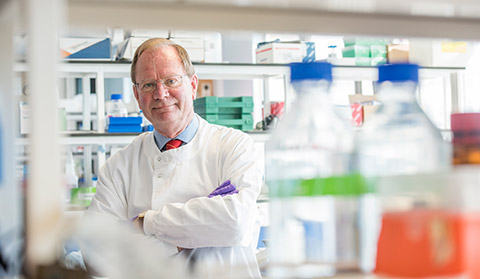Leading Southampton allergy scientist makes plea for urgent action

A Southampton scientist and leading allergy expert has called for urgent action to tackle the environmental causes of the global explosion in allergy cases, amid warnings that 70 per cent of people in the UK could have food allergies by 2060.
Professor Sir Stephen Holgate, Medical Research Council Clinical Professor of Immunopharmacology at the University of Southampton, has told the BSACI Global Allergy Symposium (10 February 2023) that environmental factors, such as the loss of biodiversity, pollution, diet and urbanisation, are fuelling a worldwide allergy epidemic. He says an urgent programme of clinical trials around the world, focusing on developing immunity among infants, is now imperative if we are to turn the tide on the spike in allergy cases.
“Prevention is best achieved in the womb and in early life because a developing child is very receptive to having its immune response shaped. We are talking about training an immune response similar to our learnings from the Covid vaccination programme,” comments Professor Holgate.
His keynote speech to the symposium, organised by the British Society for Allergy and Clinical Immunology, points to the development of mass programmes to halt and reverse the rise in allergies. Potentially, these could use bacterial extracts similar to those encountered in livestock farm dust, or minimally-processed cow’s milk as treatments. Both treatments have shown promise in pilot studies.
The talk was based on the findings of a recent landmark workshop at Dumfries House in Scotland, hosted by the then-Prince of Wales in September 2022. Sixteen world leading allergy experts from the UK, US, Finland, Germany and Hong Kong attended the two-day event last September, called Understanding the Environmental Causes of Allergic Disease to Identify Effective Interventions. Professor Holgate led the workshop which was organised by The Natasha Allergy Research Foundation, set up by the parents of Natasha Ednan-Laperouse, who died aged 15 in 2016 from anaphylaxis, the most severe form of allergic reaction.
Speaking at the BSACI symposium, Professor Holgate said that studies carried out across the world including in Africa, China, the United States, Germany and South East Asia show the loss of biodiversity is driving the rise in allergies, whereas “livestock farming and other aspects of the rural environment clearly protect against the development of allergy.”
He cites a study of 1,300 German children published last summer which showed the protective effects from allergy reactions for those brought up on traditional farms. In another example from the US, two immigrant communities with common ancestry - the Hutterites and Amish - adopted different lifestyles. The Amish stuck to traditional family farming on single farms working manually in cattle sheds whereas the Hutterites adopted the American communal farming lifestyle and used mechanical farming to help them with their practice.
“If we look at prevalence of asthma and allergy you will see a huge difference. The Amish are hugely protected, the Hutterites are not,” says Professor Holgate. Similar results have been reported across the globe where communities have chosen different and more traditional lifestyles.
Professor Holgate adds: “Where humans come into close contact with animals, the farm environment can protect against the development of allergy. High exposure to environmental microbes leads to protection against the early development of allergic disease. In contrast, decreased biodiversity is a major driver in diminishing the protective immune reactions.”
One in three people in the UK now has an allergy with conditions ranging from food and drug allergies to asthma and eczema – and the numbers continue to rise. Between two to three million people in the UK are living with food allergies and hospital admissions caused by food allergies have tripled over the last 20 years, according to recent research.*
Professor Holgate warns that on the current trajectory 70 per cent of the UK population could have food allergies by 2060* and is calling for global action. He says: “The support of King Charles and Natasha’s Foundation in bringing together allergy scientists has enabled us to come up with a plea, to help us stop the relentless rise of allergies across our populations.
“What are needed now are large global clinical trials to determine whether modifying the lung and gut microbiome in early life through trained immunity can protect against the development of allergy.”
Nadim Ednan-Laperouse OBE, co-founder of The Natasha Allergy Research Foundation, said: “It is quite clear that loss of biodiversity and the environment are key factors affecting the huge rise in the numbers of people with allergies. There is no time to lose in confronting the allergy and environment crisis. It is crucial that new landmark studies in this field are fully funded now. We, at Natasha's Foundation, intend to play our full role in delivering on the urgent actions required.”
BSACI Chief Executive Fiona Rayner said: “Our understanding of the environmental factors that cause allergies and the effective interventions is a huge breakthrough. We therefore call upon our global colleagues to undertake clinical trials to protect and prevent the further development of allergies.”
* Hospital admissions for food-induced anaphylaxis increased three-fold between 1998 and 2018, from 1.23 to 4.04 per 100,000 people a year, according to research in the British Medical Journal this year.